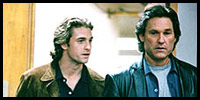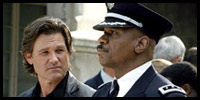
 |
Dark Blue (2003) Directed by Ron Shelton Cast: Kurt Russell, Scott Speedman, Brendan Gleeson, Ving Rhames, Michael Michele, Lolita Davidovich, Kurupt, Dash Mihok, Master P, Darrell Foster, Jonathan Banks, Khandi Alexander, Jamison Jones, Wyatt Russell 2003 – 116 minutes Rated: Reviewed by Dustin Putman, February 21, 2003.  The original, more provocative title for "Dark Blue" was "The Plague Season," based on a story by James Ellroy (1997's "L.A. Confidential"). Its inexplicable switch to the generic, mostly forgettable new moniker is a minor point, to be sure, but also telling. Directed by Ron Shelton (1999's "Play It to the Bone"), "Dark Blue" is grim and unblinking in its depiction of a group of severely crooked L.A. cops, and toplined by the vastly underrated Kurt Russell (2001's "3000 Miles to Graceland"). It also too often acceptantly spins its wheels as it unspools a narrative often as shopworn as its title.
The original, more provocative title for "Dark Blue" was "The Plague Season," based on a story by James Ellroy (1997's "L.A. Confidential"). Its inexplicable switch to the generic, mostly forgettable new moniker is a minor point, to be sure, but also telling. Directed by Ron Shelton (1999's "Play It to the Bone"), "Dark Blue" is grim and unblinking in its depiction of a group of severely crooked L.A. cops, and toplined by the vastly underrated Kurt Russell (2001's "3000 Miles to Graceland"). It also too often acceptantly spins its wheels as it unspools a narrative often as shopworn as its title.
 Set during the days leading up to the verdict of the March 1991 Rodney King trial and L.A. riots, Special Investigations Squad detective Eldon Perry (Kurt Russell) and partnered protege Bobby Keough (Scott Speedman) are assigned a quadruple homicide that took place in a convenience store. Through the investigation, Perry unflinchingly introduces Keough to the blatant misconduct and corruption running rampant through their division, headed by Sergeant Jack Van Meter (Brendan Gleeson). And as the stakes rise and Deputy Chief Arthur Holland (Ving Rhames) sets out to uncover their misdoings, Perry finds himself on a downward spiral of illegal activity that has stripped him of not only his morals, but his beloved wife, Sally (Lolita Davidovich), and teenage son (Wyatt Russell).
Set during the days leading up to the verdict of the March 1991 Rodney King trial and L.A. riots, Special Investigations Squad detective Eldon Perry (Kurt Russell) and partnered protege Bobby Keough (Scott Speedman) are assigned a quadruple homicide that took place in a convenience store. Through the investigation, Perry unflinchingly introduces Keough to the blatant misconduct and corruption running rampant through their division, headed by Sergeant Jack Van Meter (Brendan Gleeson). And as the stakes rise and Deputy Chief Arthur Holland (Ving Rhames) sets out to uncover their misdoings, Perry finds himself on a downward spiral of illegal activity that has stripped him of not only his morals, but his beloved wife, Sally (Lolita Davidovich), and teenage son (Wyatt Russell).
 "Dark Blue" is effectively gritty when need be, but for most of its running time meanders as it tries to find its central story arc. Screenwriter David Ayer (2001's quite similar and better "Training Day") and director Ron Shelton are adept in the how's and why's of the SIS unit, no matter how fictionalized it may be, and offer an intriguing background layer in its palpably felt and crucial 1991 setting. There is also a slam-bang conclusion that savvily finds the morals within its touchy issues without getting preachy.
"Dark Blue" is effectively gritty when need be, but for most of its running time meanders as it tries to find its central story arc. Screenwriter David Ayer (2001's quite similar and better "Training Day") and director Ron Shelton are adept in the how's and why's of the SIS unit, no matter how fictionalized it may be, and offer an intriguing background layer in its palpably felt and crucial 1991 setting. There is also a slam-bang conclusion that savvily finds the morals within its touchy issues without getting preachy.
 What is not so good, then, is the picture's lack of focus and originality. A feud between Perry and Holland brought up in its first half turns out to only be a disconcerting red herring, while the lack of a virtuous lead character makes one question who he or she should be rooting for and why they should care. Meanwhile, the police procedural element has "been-there-done-that" written all over it. Until the final thirty minutes, there is little energy in the plot machinations, and the characters have trouble breaking free from the one-note "types" they have been written to portray. Perry is the antihero--a man who realizes nearly before its too late the mistakes he has made. Keough is the rookie investigator initially forced into participating in the corruption before he decides to come clean. Jack Van Meter is the head of SIS so crooked in his dealings it's amazing he doesn't have a neon sign plastered to his forehead. And Sally is the long-suffering wife of Perry who, despite being written with more intelligence than the norm, is nothing more than a device at the service of the story.
What is not so good, then, is the picture's lack of focus and originality. A feud between Perry and Holland brought up in its first half turns out to only be a disconcerting red herring, while the lack of a virtuous lead character makes one question who he or she should be rooting for and why they should care. Meanwhile, the police procedural element has "been-there-done-that" written all over it. Until the final thirty minutes, there is little energy in the plot machinations, and the characters have trouble breaking free from the one-note "types" they have been written to portray. Perry is the antihero--a man who realizes nearly before its too late the mistakes he has made. Keough is the rookie investigator initially forced into participating in the corruption before he decides to come clean. Jack Van Meter is the head of SIS so crooked in his dealings it's amazing he doesn't have a neon sign plastered to his forehead. And Sally is the long-suffering wife of Perry who, despite being written with more intelligence than the norm, is nothing more than a device at the service of the story.
 Kurt Russell snaps and crackles in the highly charged role of Eldon Perry. While Perry is far from the most noble of men, Russell is a likably charismatic enough performer that it is easy to connect to his plight. Scott Speedman (2000's "Duets"), on the other hand, is badly miscast as the distraught and confused Bobby Keough. Speedman is soft-spoken and looks so squeaky clean that he appears to be playing dress-up rather than inhabiting an actual character. As Arthur Holland, Ving Rhames (1999's "Bringing Out the Dead") merely cashes a paycheck. On hand for obligatory femme support are Lolita Davidovich (1999's "Mystery, Alaska"), quite memorable with sparse screen time, and Michael Michele (2003's "How to Lose a Guy in 10 Days"), as a fellow officer who also happens to be Keough's aloof mistress.
Kurt Russell snaps and crackles in the highly charged role of Eldon Perry. While Perry is far from the most noble of men, Russell is a likably charismatic enough performer that it is easy to connect to his plight. Scott Speedman (2000's "Duets"), on the other hand, is badly miscast as the distraught and confused Bobby Keough. Speedman is soft-spoken and looks so squeaky clean that he appears to be playing dress-up rather than inhabiting an actual character. As Arthur Holland, Ving Rhames (1999's "Bringing Out the Dead") merely cashes a paycheck. On hand for obligatory femme support are Lolita Davidovich (1999's "Mystery, Alaska"), quite memorable with sparse screen time, and Michael Michele (2003's "How to Lose a Guy in 10 Days"), as a fellow officer who also happens to be Keough's aloof mistress.
 "Dark Blue" is average and unremarkable in nearly every way, paling next to "Training Day," which it closely resembles. If there is a reason to see the film at all, it is for Kurt Russell's powerhouse performance, but that is simply not reason enough to wade through material that has been seen too many times in the past to count.
"Dark Blue" is average and unremarkable in nearly every way, paling next to "Training Day," which it closely resembles. If there is a reason to see the film at all, it is for Kurt Russell's powerhouse performance, but that is simply not reason enough to wade through material that has been seen too many times in the past to count.
|
© 2003 by Dustin Putman |













